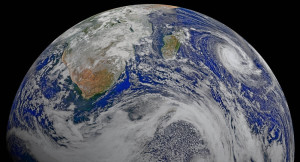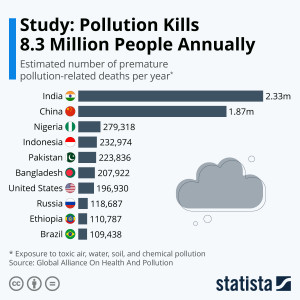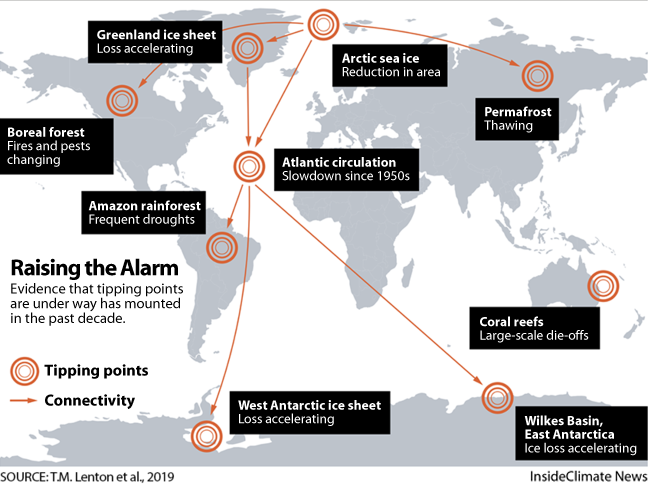How Should We Live?
Jan 30th, 2020 | By admin | Category: Other ResourcesBy Geoffrey Holland, guest writer.
Nearly a century ago, an American humorist named Will Rogers said of the human condition, “When you find yourself in a hole, the first thing you do is stop digging.” As we move through the early part of the 20th millennia, humanity is up to its ears in a hole of unprecedented depth and scale; a hole very much of our own making that is getting deeper by the day.
In November, 2019, more than 11,000 scientists from around the world endorsed a joint statement.[i] It warned of a climate emergency. They stated that humans have crossed the line with our resource consumption, our pollution, and the massive demands we are putting on our planet’s living biosphere.
‘The first rule of sustainability is to align with natural forces, or at least not try to defy them.’ – Paul Hawken, Founder, The Natural Step[ii]
We humans – every gender, every ethnicity, every creed across Planet Earth – are guilty of egregious, and potentially lethal, overreach. So many of us – too many of us – are unaware, indifferent, or even hostile to what has become a simple, all-too-obvious fact.
The Existential Threats to Life on Earth
The evidence of human overreach is overwhelming. We are stripping the life from our oceans and replacing it with hundreds of millions of tons of our plastic waste. We are cutting down our forests, exhausting our fresh water aquifers, and losing our precious top soils. Our pollution is driving climate change that causes heat waves, droughts, and wild fires that are shredding the fabric of life on every continent. We’ve got toxic industrial chemicals awash in our environment. We’ve got a billion plus humans struggling with thirst and starvation. The scope and breath of the existential threats to life on Earth is mind-boggling and getting worse every passing day.
Humans have lived as a distinct species for 200,000 to 400,000 years. From our beginnings, it took all the passing years up to about 1970 for our numbers to reach 3 billion. In just the 50 years that have passed since then, our population has exploded to nearly 8 billion; 8 billion humans, each of which needs a share of the Earth’s finite resources to survive. We continue to add about 75 million more humans to the population every passing year.
The truth is undeniable. Our collective human demands are sucking the life out the only home we have. We see evidence of this everywhere we look. A recent study reported by the U.S. National Academy of Sciences[iii] looked at the status of our Earth’s mammals. It found that of all the mammalian biomass on the planet, 60 percent is accounted for just by livestock animals destined to be slaughtered, and turned into fillets, burgers, and nuggets for human consumption. Another 36 percent of total mammalian biomass is human; just humans. The total for all other wild mammals remaining on Earth has been plunged to only 4 percent. I repeat: 4 percent; for all the rest of Earth’s wild mammals.
Just in the massive fires that started in Australia in 2019, estimates of wild animals lost exceed one billion[iv] Koalas, kangaroos, wombats; Australia’s wildlife heritage has been decimated in a single fire season.
We live now in a planetary biosphere that is hugely out-of-balance; egregiously and relentlessly exploited, and increasingly weighted down and overwhelmed by humans.
Thus far, the human commitment to corrective action has been entirely inadequate. The worst consequences of our overreach are beginning to reveal themselves. It will only get worse as time goes on.
We have no choice. We must mend our destructive ways. We must do it now.
‘You cannot get through a single day without having an impact on the world around you. What you do makes a difference, and you have to decide what kind of difference you want to make.’ – Jane Goodall, Naturalist, Founder, Roots and Shoots
Fundamentals for Survival
The challenges we face are planetary in scale. Corrective action must be implemented on a planetary scale. We are all planetary citizens, with a shared responsibility to shape a future that is life-affirming and sustainable.
Primum non nocere is a Latin phrase that means, ‘First, do no harm’. Before doing anything else, we have to recognize our destructive ways and commit as individuals to alternative behaviors that do not damage the fabric of life on Earth.
Two core principles should be at the foundation of the dialogue that will lead to a new cultural paradigm for a human society that is life-affirming and sustainable. The first is a commitment to ‘Dignity for All’. We must redefine public policy to assure a living standard that affords all planetary citizens an acceptable level of dignity, to include food, water, shelter, personal security, and access to education and healthcare.
In return for a commitment to ‘dignity for all’, the second core principle for building a human society that is life-affirming and sustainable would require that each planetary citizen share in the responsibility for protecting nature, people, and planet.
We are all planetary citizens. Standing assertively for dignity and responsibility must be the heart of any reordering of human civilization that is worthy of our species.
The World We Should Work to See
What would human civilization look like if it were organized thoughtfully and purposely to serve the core principles of dignity for all and a shared responsibility for nurturing the living biosphere?
Here are some things we could see in the kind of world we should wish for:
- All humans would regard themselves first as planetary citizens
- Human society would be organized and governed under a common set of rights and responsibilities
- The world we know would be gender equal in all ways
- Love for nature would bond humankind spiritually
- The world would be powered entirely by clean, renewable forms of energy
- The human diet would be mostly vegetarian
- The global economy would be circular, with zero waste
- Half of our Earth’s land would be re-wilded and protected in its natural state
- Our oceans would be cleansed of human plastic waste, and protected tightly by regulation
- Most food would be produced using highly efficient, cost-effective, and environmentally sustainable techniques
- Mining and resource exploitation would be tightly regulated
- Most businesses, banks, utilities, and manufacturing would be community or worker owned, and all would be tightly regulated to put the public interest first
- Every kind of media would be publicly or worker owned, and would be shaped to put the public need for unbiased information ahead of all else
- Education would be a readily accessible right of every human
- Healthcare would be a readily accessible right of every human
- All citizens would be obligated for some kind of civic duty
- Policing would be a well-respected profession, subject to strict standards to prevent abuse
- Governing laws and public policy would be life-affirming and compassionate, and would prioritize the welfare of our citizens and of our living biosphere above all else
- Privately owned guns would be strictly regulated, and military weapons would be banned from private ownership
- Synthetic chemicals would be tightly regulated, cradle to cradle
- The human population would gradually (and non-coercively) recede to a level that is compatible with our planet’s ability to provide
All of these steps, lofty and assertive as they are, are within reach technically, politically, and culturally, but there is no easy way forward. Achieving this fundamental brand of change requires bold leadership, a broadly shared grassroots commitment, and the will to stand and fight for change.
‘There can be no purpose more enspiriting than to begin the age of restoration, reweaving the wondrous diversity of life that still surrounds us.’ – Edward O. Wilson, The Diversity of Life
What We Are Up Against
The existential threats to life on Earth are perpetuated by those who profit by resisting change. There are billionaires, bankers, and corporate elites, who have become ridiculously rich by maximizing their personal profit under our current, deeply destructive economic system. Those profiteers are very much wedded to ‘business as usual’. They are in denial about climate change, and pretty much anything else they perceive as threats to their revenue streams.
The oil and gas industry may be the richest and most powerful of all the world’s economic sectors. They have known for decades that the dirty fossil fuel products they produce are substantially responsible for the carbon pollution that is driving climate change. They have stuck to a rigid posture of denial in order to maintain their profitability. They do not want the world to switch from vehicles powered by their gasoline to non-polluting electric vehicles. They use their massive wealth and craven political influence to resist any and all efforts to address the burgeoning climate threat, for which they are substantially responsible.
“In their pursuit of naked self-interest, the super-rich have thus formulated a three-part strategy: deception, disenfranchisement, and disempowerment.” – Joseph Stiglitz, Nobel Prize-winning Economist[v]
Our political process has been captured to a large degree by the rich and powerful. The print, electronic, and social media that we depend on for information do not work for the pubic. They serve primarily the billionaires and giant corporation that buy advertising and influence from them.
The takeaway from this is clear. A healthy dose of skepticism should be applied when considering the constant drone of information that comes at each of us, 24/7. When choosing what ideas and information are worthy of trust, a wise person will carefully study who benefits from the message.
How We Get to Where We Need to Go
Market capitalism in its current form has failed us. We must chart a new course.
Meaningful action on the existential threats that are already impacting life on Earth must come from the grass roots.
“You never change things by fighting the existing reality. To change something, build a new model that makes the existing model obsolete.” – Buckminster Fuller, Designer, Systems Theorist[vi]
We are not separate from the natural world. We must build a new reality; a new system that allows us to thrive as a part of nature’s order. There are hundreds of millions of people, living in every corner of planet Earth that have already embraced this ideal. If we stand together, we can put humanity on a path that is worthy of an intelligent species.
In the U.S, we live in a representative Democracy. We depend on the people we elect at the local, state, and national level to put the common interest of the people ahead of all else. In practice, because our governing model has been massively corrupted by influence money, many of the politicians we have elected are committed to serve the dysfunctional status quo. They need to be replaced. The sooner, the better.
We must identify and vote for political candidates that pledge to put nature, people, and planet first. There are two easy ways to identify them. First, look at who is financing their campaigns. Taking money from billionaires, bankers, and big corporations is a red flag. That’s not just a republican thing; democrats play that game as well. Politicians who travel that road cannot be counted on to deliver meaningful change.
![[Photo by Shadia Fayne Wood / Survival Media Agency via People Climate March NYC. (Creative Commons)]](http://populationgrowth.org/wp-content/uploads/2020/01/peoplesclimatemarch.jpg)
[Photo by Shadia Fayne Wood / Survival Media Agency via People Climate March NYC. (Creative Commons)]
Another way to determine if a candidate is the real deal is to check their website – they all have websites – to see if they support the ‘Green New Deal’.
The Green New Deal is a not a catalogue of detailed policy to be codified as law. It functions more as an American manifesto, a guideline, a set of ambitions designed to encourage transition on a planetary scale. The best thing about the Green New Deal is its excellent fit as a rallying point for voters, who support fundamental change.
Here are the primary elements in the Green New Deal:[vii]
- Delivering 100% of the power demands of the United States with clean, renewable energy resources within ten years.
- Guaranteeing a job with a family-sustaining wage, adequate family and medical leave, paid vacations, and retirement security for all people of the United States.
- Providing all citizens of the United States with high quality healthcare, adequate affordable housing, economic security, access to clean water, clean air, and healthy and affordable food.
- Providing resources, training, and high-quality education, including higher education to all the people of the United States.
- Repairing and upgrading the infrastructure in the United States, eliminating pollution and greenhouse gases as much as technically feasible.
To be sure, the Green New Deal is massively ambitious. It will take a cultural commitment at least on the scale of the mobilization for World War Two to realize its potential. It’s going to cost big money, but that shouldn’t be an issue when the future of life on Earth is at stake.
A politician that backs a Green New Deal is probably a politician that is worthy of your support.
“The Green New Deal is not just about mobilizing the public to pressure government to loosen the purse strings, pass legislation, and incentivize green initiatives. Rather, it is the first call for a new kind of peer political movement and commons governance that can empower entire communities to take direct charge of their future at a very dark moment in the history of life on Earth… We are fast approaching a biosphere consciousness. We need to be hopeful that we can get there in time.”– Jeremy Rifkin, President, Foundation on Economic Trends[viii]
Every Human’s Obligation
We are all passengers on spaceship Earth. We are the only ones, who can save ourselves. We must be the change we wish for.
Inform yourself. Be wary of false prophets and ungrounded information. Seek the truth in all ways, and embrace a common vision that is life-affirming and sustainable.
Stand for the world you wish to see. Live like the person you know you should be.
“Never doubt that a small group of thoughtful, committed citizens can change the world. Indeed, it’s the only thing that ever has.” – Margaret Mead, Anthropologist
Geoffrey Holland is the author of The Hydrogen Age, and a regular contributor to the Millennium Alliance for Humanity and the Biosphere.
_____________________
[i] https://weather.com/news/news/2019-11-05-scientists-declare-climate-emergency
[iii] https://www.pnas.org/content/115/25/6506, http://www.pnas.org/content/early/2018/05/15/1711842115
[iv] https://www.cbsnews.com/news/australia-fires-over-1-billion-animals-feared-dead/
[v] People, Power, and Profits: Progressive Capitalism for an Age of Discontent, Joseph Stiglitz, W.W. Norton & Company, New York, 2019, 27
[vi] Buckminster Fuller Institute, www.challenge/bfi.org
[vii] Rizzo, Salvador (February 11, 2019). “Fact Checker: What’s actually in the ‘Green New Deal’ from Democrats?”. Washington Post.
[viii] The Green New Deal, Jeremy Rifkin, St. Martin’s Press, New York, 2019




![[photo credit: Wikipedia]](http://populationgrowth.org/wp-content/uploads/2020/01/rivers-300x199.jpg)